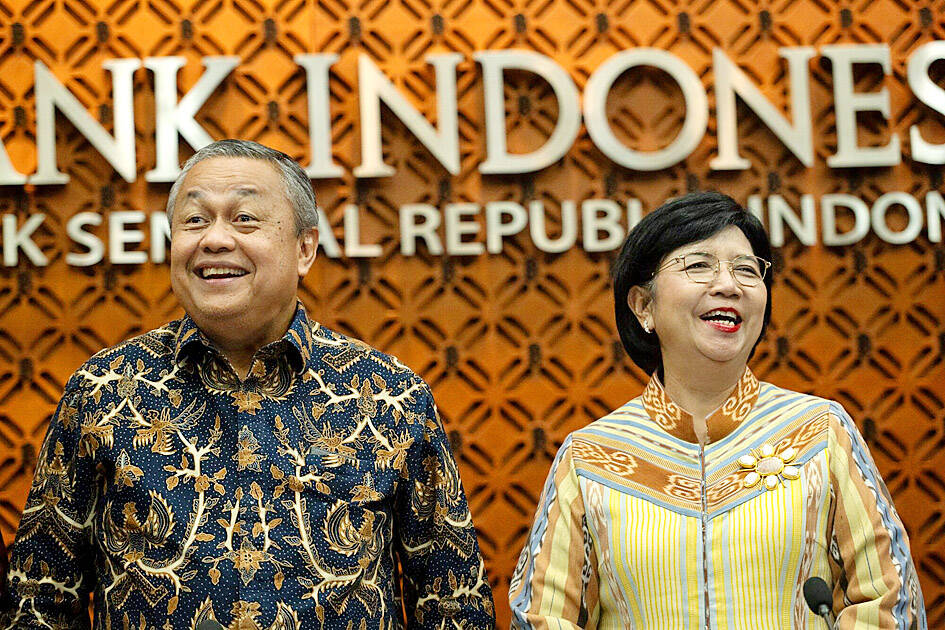Indonesia’s central bank yesterday unexpectedly cut key interest rates for the first time in more than three years as the rupiah strengthens and ahead of an expected US Federal Reserve rate reduction later in the day.
Bank Indonesia lowered the seven-day reverse repurchase rate by 25 basis points to 6 percent, marking the first such move since early 2021. Its two other main rates were also cut by 25 basis points.
“The Federal Funds Rate direction is getting clearer, and the rupiah is relatively stable and even getting stronger,” Bank Indonesia Governor Perry Warjiyo said.

Photo: Bloomberg
“These two factors are the reason why we lowered the interest rate right now,” he said.
The Indonesian central bank had steadily increased borrowing costs to defend the rupiah amid growing global economic uncertainty and rising inflation.
However, with price rises slowing, Warjiyo said the decision to cut was consistent with the bank’s prediction that inflation would remain low this year and next.
After rallying almost 7 percent this quarter, Indonesia’s currency is trading close to its strongest level versus the US dollar in a year, thanks in large part to a likely Fed cut, and low and stable domestic inflation. That gave Warjiyo scope to act sooner rather than later — especially as a more aggressive cut from the Fed would risk further rupiah gains versus the US dollar.
Tight financial conditions after 275 basis points of Bank Indonesia’s rate hikes in the past two years are also starting to show in Southeast Asia’s largest economy, Bloomberg Economics’ Tamara Henderson and Andrej Sokol said in a note this week, supporting calls for an early rate cut.
While Indonesia’s economic outlook remains solid this quarter, with the central bank keeping its GDP growth estimate this year at a range of 4.7 percent to 5.5 percent, Warjiyo said that domestic activity needs to be supported.
Additional reporting by Bloomberg

Anna Bhobho, a 31-year-old housewife from rural Zimbabwe, was once a silent observer in her home, excluded from financial and family decisionmaking in the deeply patriarchal society. Today, she is a driver of change in her village, thanks to an electric tricycle she owns. In many parts of rural sub-Saharan Africa, women have long been excluded from mainstream economic activities such as operating public transportation. However, three-wheelers powered by green energy are reversing that trend, offering financial opportunities and a newfound sense of importance. “My husband now looks up to me to take care of a large chunk of expenses,

SECTOR LEADER: TSMC can increase capacity by as much as 20 percent or more in the advanced node part of the foundry market by 2030, an analyst said Taiwan Semiconductor Manufacturing Co (TSMC, 台積電) is expected to lead its peers in the advanced 2-nanometer process technology, despite competition from Samsung Electronics Co and Intel Corp, TrendForce Corp analyst Joanne Chiao (喬安) said. TSMC’s sophisticated products and its large production scale are expected to allow the company to continue dominating the global 2-nanometer process market this year, Chiao said. The world’s largest contract chipmaker is scheduled to begin mass production of chips made on the 2-nanometer process in its Hsinchu fab in the second half of this year. It would also hold a ceremony on Monday next week to

TECH CLUSTER: The US company’s new office is in the Shalun Smart Green Energy Science City, a new AI industry base and cybersecurity hub in southern Taiwan US chip designer Advanced Micro Devices Inc (AMD) yesterday launched an office in Tainan’s Gueiren District (歸仁), marking a significant milestone in the development of southern Taiwan’s artificial intelligence (AI) industry, the Tainan City Government said in a statement. AMD Taiwan general manager Vincent Chern (陳民皓) presided over the opening ceremony for the company’s new office at the Shalun Smart Green Energy Science City (沙崙智慧綠能科學城), a new AI industry base and cybersecurity hub in southern Taiwan. Facilities in the new office include an information processing center, and a research and development (R&D) center, the Tainan Economic Development Bureau said. The Ministry

ADVERSARIES: The new list includes 11 entities in China and one in Taiwan, which is a local branch of Chinese cloud computing firm Inspur Group The US added dozens of entities to a trade blacklist on Tuesday, the US Department of Commerce said, in part to disrupt Beijing’s artificial intelligence (AI) and advanced computing capabilities. The action affects 80 entities from countries including China, the United Arab Emirates and Iran, with the commerce department citing their “activities contrary to US national security and foreign policy.” Those added to the “entity list” are restricted from obtaining US items and technologies without government authorization. “We will not allow adversaries to exploit American technology to bolster their own militaries and threaten American lives,” US Secretary of Commerce Howard Lutnick said. The entities